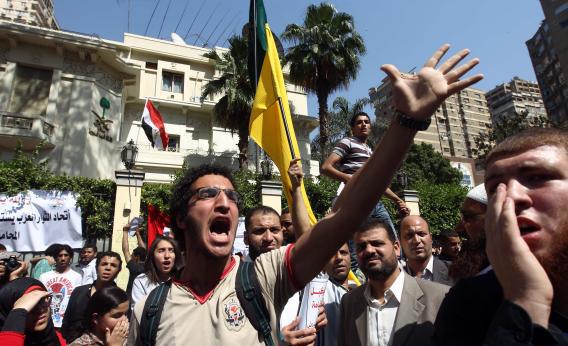An interesting spat between the Saudis and Egyptians broke out this weekend as Cairo closed down its embassy in the “kingdom” over the arrest of an Egyptian human rights activist, Ahmed al-Gizawy, during his pilgrimage to Mecca.
During the long period of US-backed “stability” in Egypt under our man Hosni Mubarak, the medieval Saudis saw much to admire in their friend, the Pharaoh, as Mubarak was known. Like them, he arrested dissidents at will. Like them, he knew where his bread was buttered (some dairy near the Pentagon in northern Virginia).
Now, however, Egyptians have become a running challenge to all that the Saudi’s hold sacred, including the idea that they could use their energy muscle to manipulate the rest of the Arab world on the one hand, and the Americans, Europeans and Israelis on the other, into thinking their monarchy is a force for moderation and “stability.”
Oh stability, the fetish of think tanks, ideologues, despots and hegemons! Who else could want to lock into place the current status quo of the Middle East? What is the state of the Middle East today if not “in transition,” (or, arguably, “in turmoil”)? Does a policy that backs “pillars of stability” in the Middle East, like our friends in Riyadh (and our former pillar, the Pharaoh), really make sense today?
And so, back to the Saudi-Egypt spat. Like the foolish Israeli-Turkish fallout and the idiotic argument between Washington and Cairo over US-funded NGOs, this offers a golden opportunity for the United States to show the world it understands what has changed. The US should:
· Call the Saudi bluff and demand Egypt’s al-Gizawy be released. The Saudis purported leverage over the Iran-oil sanctions issue is nonexistent. Saudi Arabia, more than any country (and I include Israel here) has a vital interest in preventing Iran from going nuclear. They’re not about to undercut sanctions that have, for the first time in decades, actually started to produce results.
· Demand that Israel and Turkey hold talks aimed at reestablishing stable relations. No country’s policies threaten Israel as existentially as those concocted by the Israeli government itself. By refusing to apologize for its ham-handed commando raid two years ago on a Gaza-bound aid ship, and worse, by trying to label the ambitions of a resurgent Turkey as some kind of latter day drive to reestablish the Caliphate, Israel has alienated its more important friend in the region (and made a fool of itself in the process). The US, if it truly does have Israel’s interests at heart, should start talking frankly about this and many other topics now “too sensitive” for politicians in America to broach.
· Undercut Egypt’s imperious generals and Israel’s messianic government by demanding reasonable behavior in return for billions a year in US aid. The US has paid approximately $1.3 billion in military aid to Cairo yearly since 1979 as a kind of ransom payment to secure the Camp David peace with Israel. Israel, of course, receives even larger military aid packages annually as part of the deal – some $2.7 billion in 2011. Time to demand a return-on-this investment. In Egypt, a firm commitment to continue respecting the peace and playing a role in helping Israel and its Arab neighbors take the next step. In Israel, immediate steps to defuse the greatest long-term threat to the state’s peaceful existence: the occupation of lands that should, for two decades now, ever since the Madrid talks of 1991, have been turned over to a Palestinian state. No single move would do more to secure Israel in the long run not to discredit the more radical factions of the Arab world – the Hezbollah, al-Qaeda, Iran’s Revolutionary Guard – who thrive on the broken status quo and are existentially threatened by the concept of “peace.”
Bluffs waiting to be called – but who will do it?
